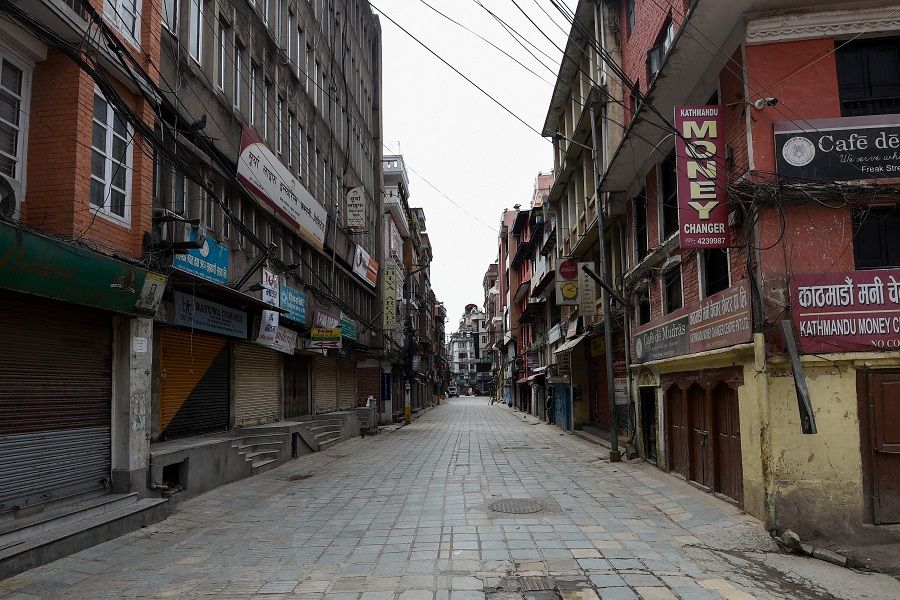Humanity is facing a crisis of global governance, not globalisation

The novel coronavirus has created a global public health crisis that is bringing on a global economic recession - possibly the worst of its kind since the 1930s - and reigniting fierce debates on the future of globalisation.
The pandemic has highlighted the downsides of globalisation. Ease of international travel has provided a rapid means for the virus to spread. When countries impose lockdowns and close their borders, production comes to a standstill and global supply chains are impacted, leading to a negative chain of international economic events. It is in such times that critics proclaim the end of globalisation.
...an effective system for global governance is needed for the proper function of globalisation.
In reality, concerns about globalisation have been around for a long time and got louder after the 2008 global financial crisis. Brexit, populism in Europe and the protectionist trade policies rolled out by the Trump administration have stymied the march of globalisation significantly. Now, havoc from the novel coronavirus is giving the anti-globalisation movement ample evidence and ammunition to further their cause. It is likely that the Covid-19 pandemic, together with various past issues, will deal a heavy blow to globalisation.
Globalisation still in the game
Nevertheless, the impetus for globalisation is intact. The process will chug along with the search for a new momentum.
Very few would deny that globalisation has markedly promoted global economic growth and technological advancement, and raised the general welfare of producers and consumers worldwide. However, globalisation is a double-edged sword. The unequal distribution of economic benefits, transnational crimes and terrorism, cultural conflicts and the spread of infectious diseases are some of its problems; global governance and international cooperation are required to tackle them. It is not unlike a country's economy that requires a market system for effective resource allocation, but also institutions and governance to ensure fair market trading and reasonable distribution of outcomes.
Globalisation has created a system for the trading of resources internationally, improving economic efficiencies, but it does not automatically ensure reasonable allocation of the increased benefits. Instead, an effective system for global governance is a precondition for the proper functioning of globalisation.

Take the outbreak of Covid-19 for instance. The infectious disease struck in a globalised era in which people, information and resources flow within an international market system. Negative externalities caused the global market to malfunction. At a time when the intervention of a powerful international governance body is needed, sadly, no effective global leadership and coordinated international action has taken place.
Mutual aid is proof that global production and supply chains have key roles to play in alleviating global disasters.
Even though it is the leading body for coordinating global responses on public health, the World Health Organisation (WHO) has been overwhelmed by the magnitude of the crisis as it lacks the support of several powerful countries in terms of leadership and resources. As the most powerful country in the world, the US's absence in this fight against the pandemic is conspicuous.
Leadership vacuum in global governance
Instead, we see countries standing by doing nothing. They fight the pandemic alone, adopting a beggar-thy-neighbour approach. There is an overall lack of communication. Also lacking is international cooperation to achieve scientific breakthroughs, such as in the development of a vaccine. It is especially painful to witness the catastrophic outcomes brought on by the lack of global governance, and worse, there is still no end in sight to the pandemic. Hence, the pandemic highlights a crisis in global governance and not of globalisation itself.
The truth is globalisation has played an important role in the fight against Covid-19. When China was the epicentre, the rest of the world used various channels to provide it with scarce medical supplies. After the epidemic spread to Europe and the US, it was China's turn to lead international society in providing aid. Mutual aid is proof that global production and supply chains have key roles to play in alleviating global disasters. Without it, would international aid have reached pandemic-stricken regions so rapidly?

The rapid surge in demand for emergency medical supplies such as masks during the pandemic resulted in acute shortages. Some blame it on global supply chains and suggest complete domestic production as the solution. Such reasoning is implausible and goes against the efficiency principle.
Domestic production is not the answer to having a timely delivery of critical supplies when an emergency occurs somewhere in the world. The chance of a major crisis occurring repeatedly in a single country is very low. It is also impossible to predict where an emergency would take place. Only the distributed production of critical supplies around the world would allow countries to help each other out in times of need. It also aligns with the efficiency principle and makes supply chains more resilient.
Globalisation still most efficient
The nature of globalisation speaks of economic efficiency and competition. So long as firms seek to maximise profits, consumers look to maximise consumption satisfaction, and countries need to improve economic benefits for its populace, globalisation will stay. So long as the benefits of allocating resources internationally outweigh the costs, multinational companies will continue to operate. Political intervention can affect the progress of globalisation in the short term but does not alter its economic impetus.
...globalisation without global governance is fragile and even dangerous.
An ironclad law of global competition is that multinational companies need to implement global strategies or risk being eliminated. Historically, globalisation has been subjected to numerous political disruptions, only to come out on top. With modern economy and current technological levels, if the world were to go back to what it was like prior to globalisation, no country would be able to prosper.
Since globalisation is unavoidable, we should focus on resolving the problems and challenges it poses. As mentioned, enhancing global governance is key because globalisation has created a complex interdependence between countries, and globalisation without global governance is fragile and even dangerous.
The scale of globalisation is constrained by two opposing factors: one is the economic forces driving expansion, the other is the rising transaction costs due to deficiencies in global governance. The global governance bottleneck needs to be overcome in order to accelerate globalisation.
Developing countries continue to grow from strength to strength but still do not have much say in global governance. At the same time, the US is growing weaker and unable to maintain its hegemony.
Globalisation is merely a functioning system. Global governance develops institutions to regulate the system. As such, the solution is enhancing global governance and not undoing globalisation. Unfortunately, what we have witnessed in recent years is sizeable damage done to the existing global governance system, causing globalisation to go out of control.
The US led the construction of the current global governance system after the Second World War. It was a positive contribution towards promoting global prosperity and preventing future world wars. In the seven decades or so since, the world has undergone fundamental changes. Developing countries continue to grow from strength to strength but still do not have much say in global governance. At the same time, the US is growing weaker and unable to maintain its hegemony. The Trump administration has unilaterally withdrawn from many areas of global governance in an indication that it is overwhelmed.
Therefore, the world needs to quickly form a multi-polar governance system through revamping the existing governance system on one hand, and establishing new organisations and injecting new vitality into them on the other. Regardless of the chosen approach, multilateralism and the participation of developing countries are very important.
To successfully resolve the many existential crises that the world faces, Sino-American cooperation is a prerequisite. Even though the chances for such cooperation are slim, it is the only way out.

Every country in the world has a part to play in this, in particular, the US and China need to cooperate. Together, they account for nearly 40% of the global economy. To successfully resolve the many existential crises that the world faces, Sino-American cooperation is a prerequisite. Even though the chances for such cooperation are slim, it is the only way out.
Globalisation needs to move beyond the economic realm to encompass broader aspects such as health, security, environmental protection and human development.
From the increasingly onerous challenge of climate change, to infectious diseases and global terrorism that do not respect borders, uneven global development, and global financial risks, which of these can be successfully dealt with by one country alone? The Covid-19 pandemic has once again shown that without an effective global governance system and close Sino-American cooperation, mankind will pay a very heavy price.
In the face of a global crisis, what an individual nation state deems to be its optimal strategy may not, in reality, be the best choice that can save the country and the world. Now is the most urgent time and best opportunity for the US and China to work together, and any attempt to cause the two to decouple will not be able to withstand the trial of a global crisis.
Globalisation urgently needs to advance with the times. The global impact of the Covid-19 pandemic on public health, society, the economy, geopolitics and our lifestyles is unprecedented. We need to reconsider the meaning and essence of international cooperation. Globalisation needs to move beyond the economic realm to encompass broader aspects such as health, security, environmental protection and human development. The pandemic has made the world acutely aware of the importance of international cooperation.
Hopefully, we can leverage on the opportunity to think through carefully the next step of human development. As Winston Churchill famously said, "Never let a good crisis go to waste." The human race has accumulated plenty of knowledge and built much consensus. All that is lacking now is global leadership with great foresight.
